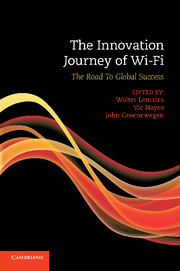1 - The case and the theoretical framework
Published online by Cambridge University Press: 05 June 2012
Summary
Wi-Fi: an unexpected success story
In this book we explore and describe the genesis and development of Wi-Fi, which has become the preferred means for connecting to the Internet – without wires: at home, in the office, in hotels, restaurants and coffee shops, at airports and railway stations, at the university campus. Increasingly Wi-Fi provides access to the Internet for remote communities in developing countries, as in the Himalayas and in the Andes. Even in rural areas of developed countries, such as Denmark, where a community-based Wi-Fi initiative has emerged to provide wireless internet access, as the incumbent operator failed to extend the broadband infrastructure to less profitable areas in a sufficiently timely manner.
This is a remarkable result, considering that wireless local area networking was not even on the radar screen of the US Federal Communications Commission (FCC) in 1979 when it initiated the market assessment project that would lead to its landmark decision in 1985. In that year the FCC decided to open up three radio frequency bands designated for industrial, scientific and medical (ISM) applications for use by radio communication systems, on the condition that spread-spectrum techniques be used.
Information
- Type
- Chapter
- Information
- The Innovation Journey of Wi-FiThe Road to Global Success, pp. 3 - 18Publisher: Cambridge University PressPrint publication year: 2010
